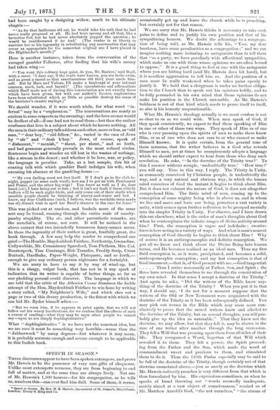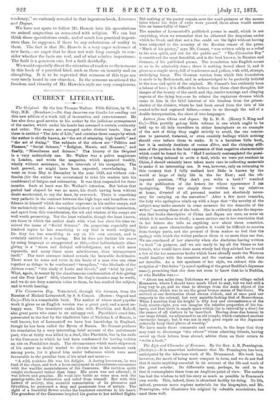SPEECH IN SEASON.*
THESE discourses appear to have been spoken extempore, and prove Mr. Haweis to be the possessor of very rare gifts of eloquence. Unlike most extempore sermons, they are from beginning to end full of matter, and at the same time are always lively. Not one of Mr. Haweis's 1,500 hearers—for his congregation, as he tells us, numbers this—can ever find him dull. Some of them, it seems, * Speech in Season. By Rev. H. R. Haweis, Incumbent of St. James's, Marylebone. London: Henry S. King and Co.
occasionally get up and leave the church while he is preaching, but certainly not for that reason.
We are sorry that Mr. Haweis thinks it necessary to take such pains to define and to justify his own position and that of his sympathising hearers. We doubt the advantage to a congrega- tion of being told, as Mr. Haweis tells his, "You, my dear brethren, have some peculiarities as a congregation ;" and we can imagine nothing more irritating to antagonists than to tell them that "as a party, we have peculiarly wide affectional sympathies, which make us one with those whose opinions we are often bound to oppose." It is a good thing to feel at one with the antagonist whom you are hitting hard (and Mr. Haweis does hit hard), but it is needless aggravation to tell him so. And the position of a man must be really weakened when he takes pains openly to justify it. We hold that a clergyman is under no further obliga- tion to the Church than to speak out his opinions boldly, and to be fully persuaded in his own mind that those opinions do not make his position in the Church untenable. As Mr. Haweis's boldness is not of that kind which needs to prove itself to itself, so also is his honesty unquestionable.
What Mr. Haweis's theology actually is we must confess is not so clear to us as we could wish. When men speak of God, if they speak consistently, we expect to find them speaking of Him in one or other of these two ways. They speak of Him as of one who is ever pressing upon the spirits of men to make them know Him, or as of one who does not care to or who cannot so make Himself known. It is quite certain, from the general tone of these sermons, that the writer believes in a God who reveals Himself to men, yet at times he conspicuously adopts a language which we should rather expect to hear from those who deny such revelation. He asks, "'Is the doctrine of the Trinity true?' To this I answer without scruple, 'undoubtedly true." How true?' you will say. True in this way, I reply. The Trinity in Unity, as commonly conceived by Christian people, is undoubtedly the way, and a very natural and obvious way, in which the human mind conceives of God the instant it begins to think about Him. But it does not exhaust the nature of God, it does not altogether comprehend Him. The finite mind of man, coming up to the conception of some mighty being who is above us, and in whom we live and move and have our being, perceives a vast variety in unity, which comes upon further reflection to be grouped mentally into the simpler Trinity in Unity. For observe, and I have drawn this out elsewhere, what is the order of man's thoughts about God when he contemplates the infinite ranges of divine activity around him? First, the conception is vague and indefinite ; creative force is here acting in a variety of ways. And what is man's nearest conception of God directly he begins to think about Him ? Why of course it is an anthropomorphic and definite conception. We put all we know and think about the Divine Being into human terms, and He becomes realised as an ideal man. 'Thus my first fluid conception is, as it were, precipitated, and becomes a said, anthropomorphic conception ; and my last conception is that of God immanent,—that is, of God present with me,—God tangential.
Thus I arrive necessarily at Father, Son, and Spirit ; the three have revealed themselves to me through the constitution of my own mind. In that sense I accept a doctrine of the Trinity." And again he asks, "Did the writers of the Bible know any- thing of the doctrine of the Trinity ? When you put it in that
way, I should say, do not for a moment suppose that the writers of the Old or New Testament were acquainted with the doctrine of the Trinity as it has been subsequently defined. You may pick out verses in the Bible which may seem most con- clusively to prove that the sacred writers knew and alluded to the doctrine of the Trinity, but on second thoughts, you will pro- bably give up the idea as untenable." That they knew not the doctrine, we may allow, but that they felt it, may be shown in the case of one writer after another through the long succession. They felt a Will that was pressing upon them from all sides of their life. They recognised a Word, begotten of that Will which revealed it to them. They felt a power, the Spirit proceed- ing from the Father and the Son, which made the word of commandment sweet and precious to them, and stimulated them to do it. Thus the 119th Psalm especially may be said to be full of the doctrine of the Trinity, though certainly not of that doctrine enunciated above,—just as surely as the doctrine which Mr. Haweis indirectly preaches is very different from that which is thus formulated by him. His expressions sometimes, as when he speaks of Israel throwing out "words avowedly inadequate, merely aimed at a vast object of consciousness," remind us of Mr. Matthew Arnold's God, "the not ourselves," "the stream of
tendency," so curiously revealed in that ingenious book, Literature and Dogma.
We have not space to follow Mr. Haweis into his speculations on animal magnetism as connected with religion. We can but think these speculations crude, and of much less practical import- ance than he supposes, if there be any substratum of reality to them. The fact is that Mr. IIaweis is a very eager welcomer of new facts,—so eager that he does not wait long enough to con- sider whether the facts are real, and of what relative importance. The fault is a generous one, but a fault decidedly.
We would especially direct the attention of readers to the-sermons in this book of a practical kind, such as those on insanity and on almsgiving. It is to be regretted that sermons of this type are very rarely heard in our churches. In the sermons mentioned the freedom and vivacity of Mr. Haweis's style are very conspicuous.



































 Previous page
Previous page